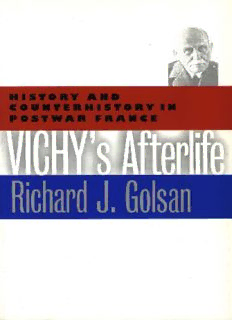
Vichy's afterlife: history and counterhistory in postwar France PDF
Preview Vichy's afterlife: history and counterhistory in postwar France
Vichy’s Afterlife Vichy’s History and Counterhistory in Postwar France Afterlife Richard J. Golsan University of Nebraska Press Lincoln & London Acknowledgments for the use of previously published material appear on pages x–xi. ∫ 2000 by the University of Nebraska Press All rights reserved Manufactured in the United States of America ! Library of Congress Cataloging-in-Publication Data Golsan, Richard Joseph, 1952– Vichy’s afterlife : history and counterhistory in postwar France / by Richard J. Golsan. p. cm. Includes bibliographical references and index. isbn 0-8032-7094-1 (pa: alk. paper) 1. France—History—German occupation, 1940– 1945—Historiography. 2. Vichy (France)—Politics and government—Moral and ethical aspects. 3. Historians—France—Attitudes. 4. War crime trials—France—Public opinion. 5. Public opinion— France. I. Title. dc397 .g59 2000 944%.597—dc21 00-024203 N This book is dedicated with love to my mother, Lucy Broyles Golsan, and to the memory of my grandmother, Mary Jones Broyles Contents Acknowledgments ix Introduction: The Body in the Basement 1 1 Memory and Justice Abused: The 1949 Trial of René Bousquet 24 2 History as Counterhistory: Modiano and the Occupation 43 3 Collaboration and Context: Louis Malle’s Lacombe Lucien and the Mode Rétro 57 4 Revising The Sorrow and the Pity: Marcel Ophuls’s Hotel Terminus 73 5 The Trial of Paul Touvier: The Law Revises History 88 6 Mitterrand’s Dark Years: A President’s ‘‘French Youth’’ 103 7 Denying the Holocaust in France: The Past and Present of an Illusion 124 8 From Vichy to Sarajevo: French Intellectuals and the Balkan Conflict 143 9 Memory’s Time Bombs: The Trial of Maurice Papon and the Algerian War 156 Conclusion: The End of the A√air? 181 Notes 185 Selected Bibliography 207 Index 219 Acknowledgments I have been interested in the history and memory of Vichy for many years, and it has been my great pleasure during that time to share that interest with a number of friends and colleagues, all of whom have taught me a great deal and have generously o√ered their advice and support on a number of occasions. In France, Annette Lévy-Willard of Libération has been a most generous friend and a valuable source of contacts, documents, infor- mation, and, most of all, conversation. Without her help on many occasions, this book would not have been possible. I have learned much from Henry Rousso, who has shared his remarkable knowledge and insights into the memory of Vichy with me on several occasions and has been most generous in making the resources of the Institut d’Histoire du Temps Présent available to me. Tzvetan Todorov has over the last several years shared his unique and rich perspectives on contemporary France and Europe with me, as has Marc Dambre and Jean-Jacques Fleury. From Rémy Desquesnes I have learned to appre- ciate in a visceral sense the sacrifices of war on visits to the Normandy beaches and cemeteries. My friends Pat and Hervé Picton have of- fered me their hospitality on my numerous trips to France. In England, Chris Flood has been a constant friend and intellectual companion for many years. In the United States, my debts are many. Lynn Higgins and Bob Soucy o√ered much helpful advice in the revision of this manuscript, and I hope neither is too disappointed by the final version. I have also learned a great deal about film and literature from Lynn and about fascism from Bob, and I have benefited as well from many conversa- tions over the years with Mary Jean Green, Rosemary Scullion, Dina Shirzer, Jean-Pierre Cauvin, Leah Hewitt, Je√rey Schnapp, Richard Wolin, Bert Gordon, Tom Hilde, and Van and Mary Kelly. In the mid-1980s I had the great pleasure of attending Steve Ungar and Dudley Andrew’s neh seminar on French fiction and film between
Description: